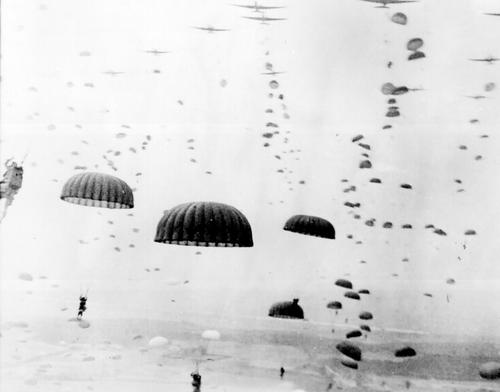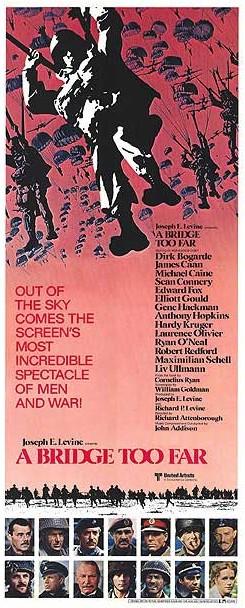The Apple Car: A Bridge Too Far?
In the war for consumer dollars, Apple needs another win. But is the rumored Apple Car too far of a reach for the iPhone giant?
August 22, 2016
The seminal 1977 war film A Bridge Too Far, directed by Richard Attenborough and based on the 1974 book of the same name by Cornelius Ryan, is a non-fiction account of the ill-fated late-1944 (World War II) Operation Market Garden conducted by a consortium of American, British, and Polish troops against the Germans. Envisioned with the goal of ending the war by Christmas of that same year, it was the most massive airborne assault ever attempted to date, intended to leap dozens of miles beyond the then-front line and seize a series of roads and bridges deep in The Netherlands enemy territory until the infantry could follow and secure them.

(Source: US Army)
Top Allied commanders were motivated to act in such a chancy manner by the slow forward land assault progress being made due to overextended supply lines, by the desire to get to Berlin ahead of the Russians simultaneously advancing from the East (along with contending egos as to which Allied country's commander would lead the charge from the West), and by their own over-confidence fueled by a recent string of successes, all coupled with poor intelligence of the Germans' lingering capabilities (and arrogant dismissal of what troubling reports they were receiving).
The outcome, as the title suggests, was predictable, at least in retrospect. Concerns raised by lower-level officers (and the troops below them) were either not elevated or were ignored by top brass. Then-seeming unimportant implementation details (such as shortwave radios with insufficient broadcast range) ended up being showstoppers. The Allied attack was decisively repulsed at Arnhem, site of the definitive Rhine river bridge that Wikipedia describes as being "the last means of escape for the German forces in The Netherlands and an excellent route to Germany for Allied forces." More than 15,000 Allied troops were killed, with even more captured. And the War would linger for nearly another year.

(Source: Wikipedia)
I've been thinking a lot about A Bridge Too Far (which I highly recommend, by the way, among other reasons due to its outstanding cast), as I read the ongoing and escalating rumors coming out of Cupertino, Calif., regarding Apple's supposed “Titan” electric (and likely at least semi-autonomous) car project. Just in recent days, for example, we've heard that the company supposedly brought hardware wizard Bob Mansfield out of semi-retirement to take charge of the development team, along with learning about a patent filing initially linked to the company and referring to a technique for connecting the two halves of an articulated vehicle, such as a mass transit bus.
The patent revelation has subsequently been chalked up to a typographical error, but it wouldn't have completely surprised me to learn that Apple was also looking at things other than conventional car form factors.
Tesla, for example, is doing the same thing. More generally, I'm a big fan of the "where there's smoke there's (at least a little bit of) fire" hypothesis, so I'm pretty sure the "whether or not" conjecture regarding Apple's electric car aspirations has already been answered (Apple executives' "wink wink nudge nudge know-what-I-mean say-no-more" reactions to press and analyst questions are also telling).
READ MORE ABOUT THE APPLE CAR:
The remaining big questions in my mind (aside from "when,” of course) are "why" and "how." The first one's fairly easy to answer in the abstract, albeit not in the specific. As recent coverage in Fast Company points out, in April the company announced "for the first time in 13 years, Apple’s revenue had decreased by 13%, from the corresponding quarter a year earlier." And "sales of iPhones had slowed even more, off 16%, an alarming development given that the smartphone accounts for 65% of the company’s total revenue." Tablet sales have already plateaued. Although Apple's share of the overall computer market is admirable, that's not exactly a still-vibrant application to hang one's hat on (and recent market share news is troubling here, too). And don't get me started on the overhyped Apple Watch ...
So Apple needs a new homerun hitter. I get that. And I also get that in the embryonic electric car era, traditional automobile manufacturers' decades' worth of R&D into legacy internal combustion engines, for example, are largely meaningless. But if Apple thinks its current supply chain situation is complex, wait until it starts sourcing and merging subsystems from dozens or hundreds of suppliers to begin building vehicles. Not to mention the necessary assembly lines (Tesla acquired an old GM/Toyota "NUMMI" plant in Fremont ... where will Apple get its factory?), incoming part and outgoing product warehouses, distribution systems, and sales showrooms (what does the company plan to do; retrofit Apple Stores?).
My other big concern, again with analogies to Operation Market Garden, is that a vehicle is so very, very orthogonal to Apple's existing businesses. Gutsy? Sure. Equally foolhardy? Mebbe. Consider, instead, if you'd heard that Apple was expanding into home appliances. Or home theater gear -- TVs, audio equipment, stuff like that. Or even better, home automation, security and surveillance systems, all markets, with tremendous upside potential but longstanding underperformance to that potential. Natural fits with Apple's HomeKit initiative, for example? You betcha. More generally, an organic extrapolation of Apple's longstanding "walled garden" vertical integration aspirations? Ditto. If you heard that new-product-line news, I bet you'd say, "hey, that makes sense." But a car? I'm skeptical, especially if Apple plans to go it standalone versus (as Google's doing) partnering and licensing its core technologies to others.
Here's a direct quote from the IMDb entry for A Bridge Too Far:
The Allies attempt to capture several strategically important bridges in The Netherlands in the hope of breaking the German lines. However, mismanagement and poor planning result in its failure.
Now try this on for size:
Apple attempts to capture several strategically important new markets in the hope of breaking existing constrained- and mature-market lines. However, mismanagement and poor planning result in its failure.
The Allies did end up winning the war, in both Europe and the Pacific, so I'm not completely counting Apple out. But I doubt the outcome will be as quick or easy as is currently being forecast inside 1 Infinite Loop, even if victory eventually comes to pass. And, as a popular Amazon Video series, The Man in the High Castle, based on a novel by Philip K. Dick points out, it's not the only possible result.
Brian Dipert is the principal at Sierra Media, which provides technology analysis and consulting, along with multimedia development and publishing. He is also editor-in-chief of the Embedded Vision Alliance, and senior analyst at BDTI (Berkeley Design Technology Inc.). Brian has a B.S. degree in Electrical Engineering from Purdue University in West Lafayette, Ind. His professional career began at Magnavox Electronics Systems in Fort Wayne, Ind.; Brian subsequently spent eight years at Intel Corp. in Folsom, Calif.
You May Also Like



